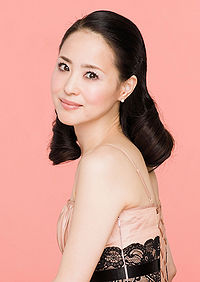Matsuda Seiko
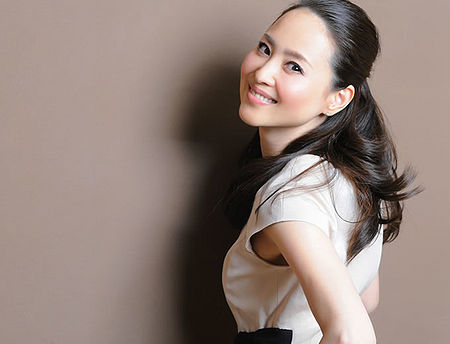
Matsuda Seiko (松田聖子) is a Japanese pop singer-songwriter and is one of Japan's most influential female artists. She got her start as an Idol starting her acting career in 1979, and made her debut as a kayokyoku singer in 1980 with "Hadashi no Kisetsu". Her next single "Aoi Sangoshou" was a breakout hit, and Matsuda became a cultural phenomenon; influencing not only music at the time but also fashion trends. Starting with the release of her 1980 single "Kaze wa Aki Iro / Eighteen" and running through 1988's "Tabidachi wa Freesia", setting a record for 25 consecutive #1 singles on the Oricon chart.
Profile
- Stage Name : Matsuda Seiko (松田聖子)
- Real Name : Kamachi Noriko (蒲池法子)
- Birth Date : March 10, 1962
- Birth Place : Fukuoka Prefecture, Japan
- Height : 159cm (5'2 ½ in.)
- Weight : 40kg (88.2 lbs.)
- Measurements : 80 / 56 / 84 cm. (31 / 22 / 33 in.)
- Blood Type: A
- Daughter : SAYAKA
Information
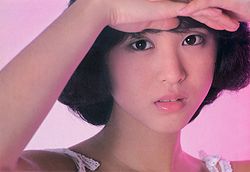
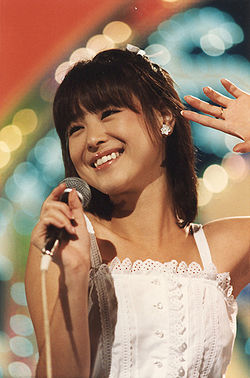
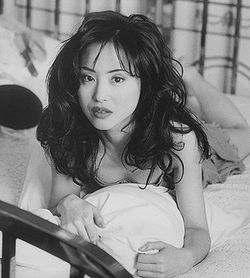
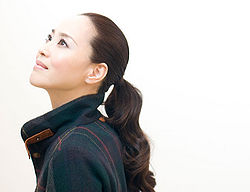
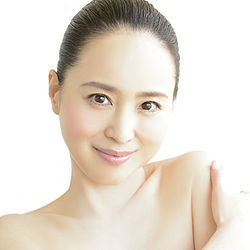
Matsuda Seiko started auditioning when she was in her first year of high school in 1978 for CBS Records' Miss Seventeen contest. Singing Sakurada Junko's "Kimagure Venus", Matsuda would pass the Kyushu region auditions and eventually win the competition later on. Although at first her parents didn't want their daughter in the idol business, they let Matsuda sign onto Sun Music Productions a year after her victory.
Matsuda first debuted as an actress, however, in the 1979 dorama Odaiji ni. She would also become an regular on the NHK Show Let's Go Young and a DJ for radio show "The Punch-Punch-Punch". She finally made her singing debut in early 1980, releasing the single "Hadashi no Kisetsu" with the catchphrase "I Want to Hold You! Miss Sony" (抱きしめたい! ミス・ソニー).
After that release, Matsuda quickly became a top idol, recognized by her trademark short hairstyle. By the end of 1980, she hit the top of the sales charts for the sale of Bromide cards and would go to win Rookie of the Year awards at various music festivals and award ceremonies. She would also catch the No. 1 spot in a survey asked to men of who they wanted to marry in 1984.
In May of 1985, Matsuda would go to Mexico to star in the television dorama Caribe Ai no Symphony, which became one of the top shows during the prime-time during that year. She eventually married her co-star, actor Kanda Masaki, before the year was up and gave birth to their first daughter, SAYAKA, a year after. She was given the nickname Mama Idol afterward because of her wish to become a mother, but still be an idol.
Matsuda soon pursued an additional career path when she opened up her own fashion shop "Flawless" in 1988. Then two years later, she made her debut on the American music scene with her first U.S.A-released English album seiko. While promoting the album, Matsuda gained the nickname "Eternal Young Girl" as she performed all over America, including New York City. But the album didn't chart and didn't sell enough to make Matsuda an American idol. She wouldn't give up, however, as she released several more singles later on ("Good For You", "all to you", and "just for tonight"), which did enter the Billboard charts in top 20 positions.
In May 1996, Matsuda would go on to appear semi-nude in the American magazine BIKINI and also changed record labels to Universal Music Japan as she released the single "Anata ni Aitakute ~Missing You~". The single was Matsuda's first #1 single to chart in eight years and sold over a million copies. But with success there is loss -- she divorced Kanda Masaki in 1997. She would later remarry to a close friend of two years in 1998 until they divorced in 2000.
To celebrate the new millennium, Matsuda once again changed labels to Sony Music Japan from 2002 until 2009, when she changed back to Universal Music Japan. She would release the album Sunshine in 2004, which was her first top ten album since 1997's My Story, charting at #6. She also celebrated her twenty-fifth anniversary a year later by having the fairy tour at various places, including the Saitama Super Arena. Attended by 5,000 fans, Matsuda showed off a new skill to them -- singing in Chinese.
Matsuda used to hold the record of 25 consecutive No. 1 singles and the record for most #1's by a female artist until Hamasaki Ayumi surpassed her in March 2006. She is known for having been reported in many scandals by the media and repeatedly changing record labels. In 2012, she married Hiromasa Kawana, a non celebrity. Many of her Albums were re-released in Blu-spec CD format in 2009. 13 Blu-spec Albums charted the Oricon Top 100 Album Charts at the same time. From time to time, Albums get a re-release and some topping the Oricon Top 300 Charts, for example Pineapple's release on 2013 charted at 300. Her daughter Sayaka died on December 18, 2021.
Discography
Studio Albums
- [1980.08.01] SQUALL
- [1980.12.02] North Wind
- [1981.05.21] Silhouette
- [1981.10.21] Kaze Tachinu (風立ちぬ)
- [1982.05.21] Pineapple
- [1982.11.10] Candy
- [1983.06.01] Utopia (ユートピア)
- [1983.12.10] Canary
- [1984.06.10] Tinker Bell
- [1984.12.08] Windy Shadow
- [1985.06.05] The 9th Wave
- [1985.08.15] SOUND OF MY HEART (as SEIKO)
- [1986.06.01] SUPREME
- [1987.05.16] Strawberry Time
- [1988.05.11] Citron
- [1989.12.06] Precious Moment
- [1990.06.07] seiko (as SEIKO)
- [1990.12.10] We Are Love
- [1991.05.02] Eternal
- [1992.03.25] 1992 Nouvelle Vague
- [1992.12.02] Sweet Memories '93
- [1993.05.21] DIAMOND EXPRESSION
- [1993.11.21] A Time for Love
- [1994.06.12] Glorious Revolution
- [1995.05.21] It's Style '95
- [1996.05.27] Vanity Fair
- [1996.05.14] Was It The Future (as SEIKO)
- [1996.12.05] Guardian Angel
- [1997.05.21] My Story
- [1997.12.03] Sweetest Time
- [1998.05.08] Forever
- [1999.12.18] Eien no Shoujo (永遠の少女)
- [2000.06.28] Seiko Matsuda: 20th Party
- [2001.06.20] LOVE&EMOTION VOL.1
- [2001.11.28] LOVE&EMOTION VOL.2
- [2002.06.21] area62 (as SEIKO)
- [2004.06.09] Sunshine
- [2005.04.06] fairy
- [2005.12.07] Under the beautiful stars
- [2006.05.31] bless you
- [2006.12.06] Eternal II
- [2007.06.06] Baby's breath
- [2008.05.21] My pure melody
- [2010.05.26] My Prelude
- [2011.06.01] Cherish
- [2012.06.06] Very Very
- [2013.06.05] A Girl in the Wonder Land
- [2014.06.04] Dream & Fantasy
- [2015.06.10] Bibbidi-Bobbidi-Boo
- [2016.06.08] Shining Star
- [2017.06.07] Daisy
- [2018.06.06] Merry-Go-Round
- [2020.09.30] SEIKO MATSUDA 2020
- [2021.10.20] SEIKO MATSUDA 2021
Best Albums
- [1981.11.01] Seiko・fragrance (聖子・fragrance)
- [1982.07.01] Seiko・index
- [1982.12.05] Kiniro no Ribbon (金色のリボン)
- [1983.11.11] Seiko・plaza
- [1984.03.15] Touch Me, Seiko
- [1984.11.01] Seiko・Town
- [1984.11.21] Seiko・Avenue
- [1985.03.06] Seiko-Train
- [1985.11.10] Seiko・Box
- [1986.11.21] LOVE BALLADE
- [1987.11.21] Snow Garden
- [1988.07.21] Seiko Monument
- [1991.11.21] Christmas Tree
- [1991.12.01] Bible
- [1994.12.01] Bible II
- [1996.03.01] Bible III
- [1996.11.01] Winter Tales
- [1997.06.21] Seaside ~Summer Tales~
- [1997.11.21] Dear
- [1998.07.18] Seiko・Celebration
- [1998.11.30] Seiko '96-'98
- [1999.04.01] Ballad ~20th Anniversary
- [2000.11.29] 『LOVE』 Seiko Matsuda 20th Anniversary Best Selection
- [2003.11.27] Another Side of Seiko 27
- [2003.11.27] Another Side of Seiko 14
- [2004.04.14] Best of Best 27
- [2004.04.14] Best of Best 13
- [2005.01.26] 『Seiko Smile』 Seiko Matsuda 25th Anniversary Best Selection
- [2009.11.11] Seiko Matsuda Christmas Songs
- [2010.09.22] Touch Me, Seiko II
- [2011.12.07] SEIKO STORY ~80's HITS COLLECTION~
- [2012.05.30] Étranger (エトランゼ)
- [2014.12.24] Seiko Matsuda Best Ballad
- [2015.12.09] We Love SEIKO -35th Anniversary Matsuda Seiko Kyuukyoku All Time Best 50 Songs- (松田聖子究極オールタイムベスト)
- [2018.01.31] Seiko Matsuda sweet days
- [2018.02.28] SEIKO MEMORIES Masaaki Omura Works (SEIKO MEMORIES ~Masaaki Omura Works~)
- [2020.04.01] Seiko Matsuda 40th Anniversary Bible ~blooming pink~
Soundtrack Albums
- [1981.08.08] Original Soundtrack Nogiku no Haka (オリジナル・サウンドトラック 野菊の墓)
- [1983.07.01] Original Soundtrack Plumeria no Densetsu (オリジナル・サウンドトラック プルメリアの伝説)
- [1984.07.07] Original Soundtrack Natsufuku no Eve (オリジナル・サウンドトラック 夏服のイヴ)
- [1985.05.03] Original Soundtrack Caribe Ai no Symphony CARIBE, Sinfonia de Amor (オリジナル・サウンドトラック カリブ・愛のシンフォニー CARIBE, Sinfonia de Amor)
- [1985.06.21] Original Soundtrack Penguins Memory Shiawase Monogatari (オリジナル・サウンドトラック ペンギンズ・メモリー 幸福物語)
- [2010.08.11] Matsuda Seiko Original Soundtrack Shuu 1981~1985 (松田聖子オリジナル・サウンドトラック集)
Other Albums
- [1989.05.21] Goya...Uta de Tsuzuru Shougai (ゴヤ…歌でつづる生涯)
- [1999.03.31] Seiko '96-'98 Original Backing Tracks (Instrumental Album)
- [1999.10.06] SEIKO MATSUDA: RE-MIXES (Remix Album)
- [2000.09.27] seiko remixes 2000 (Remix Album)
- [2004.04.14] SEIKO BALLADS ~SWEET MEMORIES~ (Tribute Album)
- [2005.08.26] I'll fall in love Ai De Li Wu (愛的禮物) (Taiwan Album)
- [2006.12.13] Jewel Songs ~Seiko Matsuda Tribute & Covers~ (Tribute Album)
- [2017.03.29] SEIKO JAZZ (Jazz Album)
- [2019.02.20] SEIKO JAZZ 2 (Jazz Album)
- [2024.02.14] SEIKO JAZZ 3 (Jazz Album)
Singles
- [1980.04.01] Hadashi no Kisetsu (裸足の季節; Barefoot Season)
- [1980.07.01] Aoi Sangoshou (青い珊瑚礁; Blue Coral reef)
- [1980.10.01] Kaze wa Aki Iro / Eighteen (風は秋色; Wind is autumn color)
- [1981.01.21] Cherry Blossom (チェリーブラッサム)
- [1981.04.21] Natsu no Tobira (夏の扉; Summer door)
- [1981.07.21] Shiroi Parasol (白いパラソル; White umbrella)
- [1981.10.07] Kaze Tachinu (風立ちぬ; Windless)
- [1982.01.21] Akai Sweet Pea (赤いスイートピー; Red sweet pea)
- [1982.04.21] Nagisa no Balcony (渚のバルコニー; Nagisa's balcony)
- [1982.07.21] Komugi Iro no Mermaid (小麦色のマーメイド; Wheat mermaid)
- [1982.10.21] Nobara no Etude (野ばらのエチュード; Wildhouse etude)
- [1983.02.03] Himitsu no Hanazono (秘密の花園; The secret garden)
- [1983.04.27] Tengoku no Kiss (天国のキッス; Heaven's Kiss)
- [1983.08.01] Glass no Ringo / SWEET MEMORIES (ガラスの林檎; Glass apple)
- [1983.10.28] Hitomi wa Diamond (瞳はダイアモンド; Eyes are diamonds)
- [1984.02.01] Rock'n Rouge
- [1984.05.10] Jikan no Kuni no Alice / Natsufuku no Eve (時間の国のアリス/夏服のイヴ; Alice of the Country of Time / Eve of the Summer Clothes)
- [1984.08.01] Pink no Mozart (ピンクのモーツァルト; Mozart of pink)
- [1984.11.01] Heart no Earring (ハートのイアリング; Heart Earring)
- [1985.01.30] Tenshi no Wink (天使のウィンク; Angel's wink)
- [1985.05.09] Boy no Kisetsu (ボーイの季節; Boy's season)
- [1985.06.24] DANCING SHOES (as SEIKO)
- [1987.04.22] Strawberry Time
- [1987.11.06] Pearl-White Eve
- [1988.04.14] Marrakech (Marrakech~マラケッシュ~)
- [1988.09.07] Tabidachi wa Freesia (旅立ちはフリージア; Farezia's departure)
- [1989.11.15] Precious Heart
- [1990.07.15] THE RIGHT COMBINATION (as SEIKO)
- [1990.11.21] We Are Love
- [1992.02.05] Kitto, Mata Aeru... (きっと、また逢える…; I'm sure I can meet again ...)
- [1992.08.01] Anata no Subete ni Naritai / Shinin' Shinin' (あなたのすべてになりたい; I want to be your all)
- [1993.04.21] Taisetsu na Anata (大切なあなた; Important you)
- [1993.05.21] A Touch of Destiny / SWEET MEMORIES (English New Version)
- [1993.11.10] Kakowarete, Aijing (かこわれて、愛jing; I love you, love me jing) (as Matsuyakko)
- [1994.05.11] Mou Ichido, Hajime Kara (もう一度、初めから; Again, from the beginning)
- [1994.12.01] Kagayaita Kisetsu e Tabidatou (輝いた季節へ旅立とう; Let's go on a shining season)
- [1995.04.21] Suteki ni Once Again (素敵にOnce Again; Wonderfully Once Again)
- [1996.04.22] Anata ni Aitakute ~Missing You~ (あなたに逢いたくて~Missing you~; I miss you ~ Missing you ~)
- [1996.05.17] I'll Be There For You (Seiko Matsuda with Robbie Nevil)
- [1996.11.18] Sayonara no Shunkan (さよならの瞬間; Goodbye moment)
- [1997.04.23] Watashi Dake no Tenshi ~Angel~ / Anata no Sono Mune ni (私だけの天使~Angel~/あなたのその胸に; Only Angel/ in your hearts)
- [1997.12.03] Gone with the rain
- [1998.06.17] Koisuru Omoi ~Fall in love~ (恋する想い~Fall in love~)
- [1998.11.26] Touch the LOVE
- [1999.10.27] Kanashimi no Boat (哀しみのボート; Sorrow boat)
- [2000.05.17] 20th Party
- [2000.06.07] Shanghai Love Song (上海ラブソング; Shanghai Love Song)
- [2000.06.14] Unseasonable Shore
- [2000.09.27] True Love Story / Sayonara no KISS wo Wasurenai (さよならのKISSを忘れない; I will not forget the good-bye KISS) (Hiromi Go / Seiko Matsuda)
- [2000.11.29] The Sound of Fire
- [2001.06.20] Anata Shika Mienai (あなたしか見えない; Only you can not see it)
- [2001.11.14] Ai♡Ai ~100%♥Pure Love~ (愛♡愛~100%♥Pure Love~)
- [2002.06.05] Suteki na Ashita (素敵な明日; Nice tomorrow)
- [2003.06.04] Call me
- [2004.05.26] Aitai (逢いたい; I want to see you.)
- [2004.07.07] Smile on me (SEIKO & Crazy.T)
- [2005.02.02] Eien Sae Kanjita Yoru (永遠さえ感じた夜; Night that even eternity felt)
- [2005.08.24] I'll fall in love
- [2005.09.21] Shiawase na Kimochi (しあわせな気持ち; Happy feelings)
- [2006.04.26] bless you
- [2006.05.24] WE ARE. (as PawPaw)
- [2007.05.23] Namida ga Tada Koboreru Dake (涙がただこぼれるだけ; Just a tear falls)
- [2007.08.01] Manatsu no Yoru no Yume (真夏の夜の夢; Midsummer Night's Dream) (Matsuda Seiko x Fujii Takashi)
- [2007.11.21] Christmas no Yoru (クリスマスの夜; Christmas night)
- [2008.03.19] Hanabira Mau Kisetsu ni (花びら舞う季節に; In the season when the petals dance)
- [2008.06.25] Love is all
- [2008.10.22] Ano Kagayaita Kisetsu (あの輝いた季節; That shining season)
- [2010.05.05] Ikutsu no Yoake wo Kazoetara (いくつの夜明けを数えたら; How many dawn are counted)
- [2011.11.23] Tokubetsu na Koibito / Koe Dake Kikasete (特別な恋人 / 声だけ聞かせて; Let only special lover / voice)
- [2012.05.02] Namida no Shizuku (涙のしずく; Drop of tears)
- [2013.05.22] LuLu!!
- [2014.05.21] I Love You!! ~Anata no Hohoemi ni~ (あなたの微笑みに; To your smile)
- [2015.10.28] Eien no Ai de Kawaranai Ai de / Wakusei ni Naritai (永遠のもっと果てまで/惑星になりたい; To the end of eternity / I want to be a planet)
- [2016.09.21] Bara no You ni Saite Sakura no You ni Chitte (薔薇のように咲いて 桜のように散って; It blooms like a rose and scatters like a cherry tree)
Split Singles
- [2010.04.21] Yazima Biyoushitsu feat. Princess Seiko - Idol Mitai ni Utawasete
- [2013.10.30] Yume ga Samete (夢がさめて; Awaken Dream) (Matsuda Seiko & Chris Hart)
UK/USA Singles
- [1990.04.??] All the way to heaven (as SEIKO)
- [1990.07.15] THE RIGHT COMBINATION (as SEIKO)
- [1990.10.01] who's that boy (as SEIKO)
- [1996.04.24] Let's Talk About It (as SEIKO)
- [1996.12.10] Good For You (as SEIKO)
- [2002.??.??] all to you (as SEIKO)
- [2002.12.17] just for tonight (as SEIKO)
Special Releases
- [1996.09.21] Complete Bible
- [1997.04.01] Seiko Matsuda 1980-1995
- [2000.07.05] SEIKO SUITE
- [2005.06.08] 25th Anniversary Seiko Matsuda PREMIUM DVD BOX
- [2006.07.19] Seiko Matsuda
- [2009.09.30] Premium Diamond Bible
- [2009.09.30] Diamond Bible
- [2010.05.06] Seiko Matsuda Single Collection 30th Anniversary Box ~The Voice of a Queen~
PV Collection
- [1987.09.21] Strawberry Time
- [1990.09.21] The Right Combination
- [1991.08.01] SEIKO Clips
- [1991.09.15] Crazy For You
- [1992.06.01] SEIKO CLIPS 2 1992 Nouvelle Vague
- [1993.06.21] SEIKO CLIPS 3 DIAMOND EXPRESSION
- [1994.06.22] SEIKO CLIPS 4 Glorious Revolution
- [1995.03.24] Video Bible ~Best Hits Video History~
- [1995.07.01] SEIKO CLIPS 5 It's Style '95
- [1996.06.03] Vanity Fair
- [1996.12.01] Bon Voyage ~The Best Lives and Clips~
- [1996.12.20] WAS IT THE FUTURE
- [1997.06.04] My Story
- [1998.06.01] Forever
- [1998.12.02] Seiko '96-'98
- [2001.03.28] Video the LOVE ~Seiko Matsuda 20th Anniversary Video Collection 1996-2000~
- [2002.03.27] LOVE&EMOTION
- [2010.09.29] Seiko Matsuda Video Diamond Bible
Live Concert
- [1982.06.21] Fantastic Concert Lemon no Kisetsu (ファンタスティック・コンサート レモンの季節)
- [1982.06.21] Fantastic Concert Nagisa no Balcony (ファンタスティック・コンサート 渚のバルコニー)
- [1984.02.25] Seikoland ~ Budokan Live '83 (武道館ライブ)
- [1984.02.25] SWEET MEMORIES Seiko Matsuda Budokan Live '83
- [1985.08.01] SEIKO CALL ~Live'85~
- [1987.06.01] Super Diamond Revolution
- [1987.11.28] Strawberry Time FROM Super Diamond Revolution
- [1988.09.14] SWEET SPARK STREAM
- [1990.04.21] Precious Moment ~1990 Live At The Budokan~
- [1991.09.21] 1991 Concert Tour Amusement Park
- [1992.10.01] LIVE 1992 Nouvelle Vague
- [1993.11.01] LIVE DIAMOND EXPRESSION
- [1994.10.21] Live Glorious Revolution
- [1995.11.22] LIVE It's Style '95
- [1996.11.11] Live Vanity Fair '96
- [1997.10.08] Seiko Live '97 My Story
- [1998.12.02] SEIKO LIVE '98 Forever
- [2000.03.29] Seiko Matsuda Zepp Tour 1999 137Bun 33Byou no Kiseki (松田聖子Zepp Tour 1999 137分33秒の奇跡)
- [2000.12.13] SEIKO MATSUDA CONCERT TOUR 2000 20th Party
- [2001.11.28] SEIKO MATSUDA CONCERT TOUR 2001 LOVE&EMOTION
- [2002.11.20] Seiko Matsuda Concert Tour 2002 Jewel Box
- [2003.11.27] SEIKO MATSUDA CONCERT TOUR 2003 Call me
- [2004.03.10] SEIKO MATSUDA COUNT DOWN LIVE PARTY 2003-2004
- [2004.11.17] SEIKO MATSUDA CONCERT TOUR 2004 Sunshine
- [2005.11.23] 25th Anniversary SEIKO MATSUDA CONCERT TOUR 2005 fairy
- [2006.03.24] SEIKO MATSUDA COUNT DOWN LIVE PARTY 2005-2006
- [2006.09.20] SEIKO MATSUDA CONCERT TOUR 2006 "bless you"
- [2007.03.28] SEIKO MATSUDA COUNT DOWN LIVE PARTY 2006-2007
- [2007.09.19] SEIKO MATSUDA CONCERT TOUR 2007 Baby's breath
- [2008.03.26] SEIKO MATSUDA COUNT DOWN LIVE PARTY 2007-2008
- [2008.10.22] SEIKO MATSUDA CONCERT TOUR 2008 My pure melody
- [2009.03.18] SEIKO MATSUDA COUNT DOWN LIVE PARTY 2008-2009
- [2009.11.18] Seiko Matsuda Concert Tour 2009 "My Precious Songs"
- [2010.03.31] SEIKO MATSUDA COUNT DOWN LIVE PARTY 2009~2010
- [2010.11.17] SEIKO MATSUDA CONCERT TOUR 2010 "My Prelude"
- [2011.04.13] SEIKO MATSUDA COUNT DOWN LIVE PARTY 2010~2011
- [2011.11.23] Seiko Matsuda Concert Tour 2011 Cherish
- [2012.03.28] SEIKO MATSUDA Count Down Live Party 2011-2012
- [2013.11.20] SEIKO MATSUDA CONCERT TOUR 2013 “A Girl in the Wonder Land”~BUDOKAN 100th ANNIVERSARY~
- [2014.03.26] 2013 New Year's Eve Live Party -Count Down Concert 2013-2014
- [2014.11.12] Pre 35th Anniversary Seiko Matsuda Concert Tour 2014 Dream & Fantasy
- [2015.12.09] 35th Anniversary Seiko Matsuda Concert Tour 2015 Bibbidi-Bobbidi-Boo
- [2016.11.16] Seiko Matsuda Concert Tour 2016 Shining Star
- [2017.11.15] Seiko Matsuda Concert Tour 2017 Daisy
- [2018.11.14] Seiko Matsuda Concert Tour 2018 Merry-go-round
- [2019.11.20] Pre 40th Anniversary Seiko Matsuda Concert Tour 2019 "Seiko's Singles Collection"
- [2021.11.24] Happy 40th Anniversary!! Seiko Matsuda Concert Tour 2020~2021 "Singles & Very Best Songs Collection!!"
Works
Dramas
- [1979] Odaiji ni (おだいじに)
- [1981] Kakurenbo (かくれんぼ)
- [1981] Tamanegi Muitara... (玉ねぎむいたら…)
- [1983] Hajimete no Jouji (はじめての情事)
- [1987] Sweet Memories (スウィート・メモリーズ)
- [1989] Kaze ni Koishite (風に恋して)
- [1990] Mama Haha Sensou (ママ母戦争)
- [1992] Otona no Sentaku (おとなの選択)
- [1992] Kisetsu Hazure no Kaigan Monogatari '92 Aki (季節はずれの海岸物語'92秋)
- [1993] Watashitte Busu Datta no? (わたしってブスだったの?)
- [1994] Kazoku Network (家族ネットワーク)
- [1994] Kisetsu Hazure no Kaigan Monogatari Final (季節はずれの海岸物語ファイナル)
- [1997] The Big Easy (USA)
- [2004] Tatta Hitotsu no Takara Mono (たったひとつのたからもの)
- [2005] Yonimo Kimyona Monogatari "Kako ga Todoku Gogo" (世にも奇妙な物語"過去が届く午後")
- [2007] Hanazakari no Kimitachi e (花ざかりの君たちへ)
- [2008] Wada Akiko Monogatari (和田アキ子物語)
- [2008] Hanazakari no Kimitachi e SP (花ざかりの君たちへ)
- [2010] BONES (USA)
Films
- [1981] Nogiku no Haka (野菊の墓)
- [1983] Plumeria no Densetsu (プルメリアの伝説)
- [1984] Natsufuku no Eve (夏服のイヴ)
- [1985] Caribe Ai no Symphony (カリブ・愛のシンフォニー)
- [1990] Docchi mo Docchi (どっちもどっち)
- [1996] Final Vendetta (USA)
- [1998] Armageddon (USA)
- [1999] Drop Dead Gorgeous (USA)
- [2000] Partners (USA)
- [2001] Gedo (USA)
- [2001] Sen-nen no Koi Hikaru Genji Monogatari (千年の恋 ひかる源氏物語)
- [2007] Shanghai Baby (Germany (English))'
- [2008] Hotaru no Haka (火垂るの墓)
- [2010] Yazima Biyoushitsu THE MOVIE ~Yume wo Tsukama Nevada~ (矢島美容室 THE MOVIE ~夢をつかまネバダ)
Voice Acting
- [1985] Penguins Memory Shiawase Monogatari (ペンギンズ・メモリー 幸福物語)
- [2002] King of the Hill (USA)
- [2007] Doraemon (ドラえもん)
Radio
- [1980.01 ~ 1980.12] The Punch Punch Punch (ザ・パンチ・パンチ・パンチ)
- [1980.10 ~ 1983.03] Pink no Sneaker (ピンクのスニーカー)
- [1980.12 ~ 1981.03] Nakatsuka Masayuki no Gattsu Gattsu Night (中塚政幸のガッツガッツナイト)
- [1981.04 ~ 1983.03] Yume de Aetara (夢で逢えたら)
- [1982.04 ~ 1983.03] Hitotsubu no Seishun (ひとつぶの青春)
- [1983.10 ~ 1985.03] Ai ni Kuchizuke (愛にくちづけ)
Citations / Awards
- 1980: Nippon Television Music Festival for Rookie of the Year Award
- 1980: Young Song Big Prize for Best New Face Grand Prix Award
- 1980: Ginza Music Festival for Special Judge Honorable Mention Award
- 1980: Shinjuku Music Festival for Gold Prize
- 1980: Yokohama Music Festival for Rookie of the Year Award
- 1980: You Choose All-Japan Song Music Festival for Rookie of the Year Award
- 1980: Japan Music Awards for Rookie of the Year Award
- 1980: FNS Music Festival for Rookie of the Year Award
- 1980: Japan Cable Radio Awards for Rookie of the Year
- 1980: All-Japan Cable Big Prize for Rookie of the Year Award
- 1980: 22nd Annual Japan Record Awards for Rookie of the Year Award
- 1981: Nippon Television Music Festival for Golden Pigeon Award
- 1981: Japan Music Awards for Broadcast Music Award
- 1981: You Choose All-Japan Song Music Festival for Judge's Honorable Mention Award
- 1981: 23rd Annual Japan Record Awards for Golden Idol Award
- 1982: CBS Sony for Hit Award
- 1982: Nippon Television Music Festival for Top Idol Award
- 1982: You Choose All-Japan Song Music Festival for Special Award
- 1982: Japan Music Awards for Broadcast Music Award
- 1982: FNS Music Festival for Grand Prix Award
- 1982: Japan Cable Radio Awards for Music Award
- 1982: All-Japan Cable Big Prize for Superior Star Award
- 1982: 24th Japan Record Awards for Gold Prize
- 1983: CBS Sony for Hit Award
- 1983: Nippon Television Music Festival for Top Idol Award
- 1983: You Choose All-Japan Song Music Festival for Golden Grand Prix Award
- 1983: All-Japan Cable Big Prize for Best Broadcast of Music Award
- 1983: 25th Annual Japan Record Awards for Gold Prize and Best Album Award
- 1986: 28th Annual Japan Record Awards for Album Award
- 1988: CBS Sony for Golden Disc Award
- 1990: Nikkan Sports Film Award for Topic Award
- 1992: 32nd Annual Japan Record Awards for Best Vocals Award
- 2009: 18th Japan Movie Critics Awards for Judges' Special Prize ("Hotaru no Haka")
External Link
| ||||||||||||||||||||||||||||||||||||||||||
